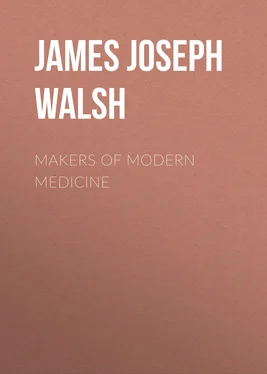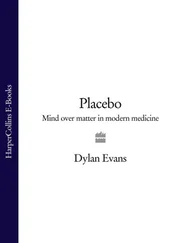James Walsh - Makers of Modern Medicine
Здесь есть возможность читать онлайн «James Walsh - Makers of Modern Medicine» — ознакомительный отрывок электронной книги совершенно бесплатно, а после прочтения отрывка купить полную версию. В некоторых случаях можно слушать аудио, скачать через торрент в формате fb2 и присутствует краткое содержание. Жанр: foreign_prose, Медицина, foreign_antique, на английском языке. Описание произведения, (предисловие) а так же отзывы посетителей доступны на портале библиотеки ЛибКат.
- Название:Makers of Modern Medicine
- Автор:
- Жанр:
- Год:неизвестен
- ISBN:нет данных
- Рейтинг книги:3 / 5. Голосов: 1
-
Избранное:Добавить в избранное
- Отзывы:
-
Ваша оценка:
- 60
- 1
- 2
- 3
- 4
- 5
Makers of Modern Medicine: краткое содержание, описание и аннотация
Предлагаем к чтению аннотацию, описание, краткое содержание или предисловие (зависит от того, что написал сам автор книги «Makers of Modern Medicine»). Если вы не нашли необходимую информацию о книге — напишите в комментариях, мы постараемся отыскать её.
Makers of Modern Medicine — читать онлайн ознакомительный отрывок
Ниже представлен текст книги, разбитый по страницам. Система сохранения места последней прочитанной страницы, позволяет с удобством читать онлайн бесплатно книгу «Makers of Modern Medicine», без необходимости каждый раз заново искать на чём Вы остановились. Поставьте закладку, и сможете в любой момент перейти на страницу, на которой закончили чтение.
Интервал:
Закладка:
A very striking life in its lessons for the serious student of medical problems is that of Edward Jenner, who first demonstrated to the world that a simple attack of mild, never fatal, cowpox, deliberately acquired, might serve as a protective agent against the deadly smallpox, which before that time raged so violently all over the civilized world. His successful solution of this problem has probably saved more lives and suffering than any other single accomplishment in the whole history of medicine. While this fact is apparently not generally appreciated, Jenner's discovery did not come by mere chance, but was the result of his genius for original investigation, which led him to make many other valuable observations covering nearly the whole range of medicine; nor indeed was his activity limited to medicine alone, but extended itself to many of the allied sciences, and even to scientific departments quite beyond the domain of medicine.
In medicine we owe to Jenner the first hint of the possible connection between rheumatism and heart disease. He pointed out, at a discussion in a little English medical society, how often affections of the heart occurred in those who had suffered from previous attacks of rheumatism. He was among the first, perhaps the very first, to hint at the pathological basis of angina pectoris. While Heberden's name is usually connected with this discovery, there seems good reason to think that already Jenner had independently noted and called attention to the frequency with which degenerative affections of the arteries within the heart muscle itself were to be found where during life heart-pang had been a prominent and annoying symptom.
Besides these important advances in medicine made by him, and his great discovery of the identity of cowpox and smallpox, Dr. Jenner was an interesting observer of phenomena in all the biological sciences, and in geology and palaeontology. He was a great friend of Dr. John Hunter, who frequently suggested to him the making of such experiments and observations as were more likely to succeed in the country than in the city, and one cannot help but be struck with the determination evinced all his life to take nothing on authority, but to test everything by actual observation, and above all not to theorize where he did not have the actual data necessary for assured conclusions; and even where he thought he had them, his wonderful faculty for waiting until they had properly matured, and their true significance had become evident, stamped him for all time as a model for scientific investigators.
Undoubtedly Jenner's greatest work was that of determining the value of vaccination. His patient investigation of this subject, the thorough conservatism with which he guarded himself from publishing his conclusions until he had tested them in every way, the absence of that haste to rush into print so characteristic of most present-day medical investigators, and which is the cause of so much disappointment in modern medicine, all distinguished this country physician as one of the greatest investigating geniuses that medicine has produced. His life is a mirror for the medical student and the investigating practitioner of medicine. His discovery was so complete when he finally announced it that but very little has been added to it since. His invention came from his mind as Minerva from the brain of Jove fully armed for the conflict that was sure to come. In this Jenner resembled very much Laennec and the other investigating geniuses in medicine. As a matter of fact only one improvement has been made in the preparation of vaccine material since Jenner's time, and that is the incorporation of glycerin in very recent years, which gradually destroys any micro-organisms that may be present, leaving the vaccine virus itself unimpaired in its efficacy, though without the possibility of inflicting those secondary infections which for so long cast a shadow on vaccination.
Dr. Edward Jenner was the third son of an Anglican clergyman, his mother being the daughter of a clergyman who had been at one time prebend in the cathedral of Bristol. The family held considerable property in Gloucestershire. He received his early education at Wotton-under-Edge and later at Cirencester, the old Roman town in Gloucestershire. While he acquired a good working knowledge of the classics, from his earliest years he was interested in natural history. Before he was nine he made a collection of the nests of the dormouse. The hours that other boys spent at play he devoted to searching for fossils or other interesting natural curiosities.
After his preliminary education had been finished he was apprenticed to Mr. Ludlow, an eminent surgeon at Bristol, and after two years here he went to London, where he had the privilege of residing as a favorite pupil in the family of John Hunter for two years. At this time Jenner was in his twenty-first year, John Hunter in his forty-second. Hunter was not then a public lecturer, but he had been for two years surgeon to St. George's Hospital, and for nearly five years had been engaged in studying the habits and structure of animals in a menagerie and laboratory which he had established at Brompton. The inspiration of Hunter's original genius meant much for young Jenner. He learned not only to respect the teacher but to love the man. In Hunter's unquenchable desire for knowledge and love of truth there was something very congenial to the spirit of Jenner, who was himself, above all things, an inquirer.
After completing his two years of work with Hunter he still remained intimately associated with him by letter. Though later in life Jenner's correspondence became very voluminous, these letters from Hunter were always very carefully preserved in a special cover, and they serve to show how stimulating to the young man must have been Hunter's virile enthusiasm for truth as it could be deduced by observation and experiment.
It was to Hunter that Jenner once wrote that he had heard it said in Gloucestershire that the dairy workers who suffered from a certain disease caught from the udders of cows and called cowpox were protected thereafter from attacks of smallpox. He added that this tradition interested him very much and that he intended to think about it. "Don't think," wrote Hunter to him, in return; "make observations, investigate for yourself the truth of the tradition." Jenner did so, and the result is now known to all.
These letters from Hunter contained many other interesting suggestions. For instance, it was under Hunter's direction that Jenner succeeded in finding out that in hibernating animals the temperature is very much reduced and the respirations are very slow, while the rate and force of the pulse are often so much diminished as to be scarcely more than noticeable at the extremities. Between Hunter and Jenner it had already been discovered that the sap in trees will not freeze at temperatures much lower than that at which the same fluid freezes when withdrawn from the tree, and the same thing seemed to be true with regard to the blood of hibernating animals. He learned that notwithstanding the low temperature to which it is reduced the animals are not affected particularly by the cold, though their store of fat is consumed and they awake very hungry in the spring-time.
Besides hibernation Jenner also investigated the habits of the cuckoo, that crux of the biologist which insists on foisting its eggs upon other birds and allowing its orphan young to be brought up in alien nests, while the real young of the deceived foster-parents are often pushed out of their nests by this burly intruder which grows so fast and strong. It is needless to say, this subject interested John Hunter very much and there are a number of letters which passed between them on the subject.
It must not be supposed, however, that young Jenner was entirely occupied with his scientific work to the exclusion of social life and recreation. He was one of the best-known men of the county, and was looked upon as a genial companion from whom might be expected on almost any occasion pleasant jests and epigrams, not too biting, with regard to friends and acquaintances. Some of these have been preserved and we quote several of them as indicative of his special vein of humor.
Читать дальшеИнтервал:
Закладка:
Похожие книги на «Makers of Modern Medicine»
Представляем Вашему вниманию похожие книги на «Makers of Modern Medicine» списком для выбора. Мы отобрали схожую по названию и смыслу литературу в надежде предоставить читателям больше вариантов отыскать новые, интересные, ещё непрочитанные произведения.
Обсуждение, отзывы о книге «Makers of Modern Medicine» и просто собственные мнения читателей. Оставьте ваши комментарии, напишите, что Вы думаете о произведении, его смысле или главных героях. Укажите что конкретно понравилось, а что нет, и почему Вы так считаете.












